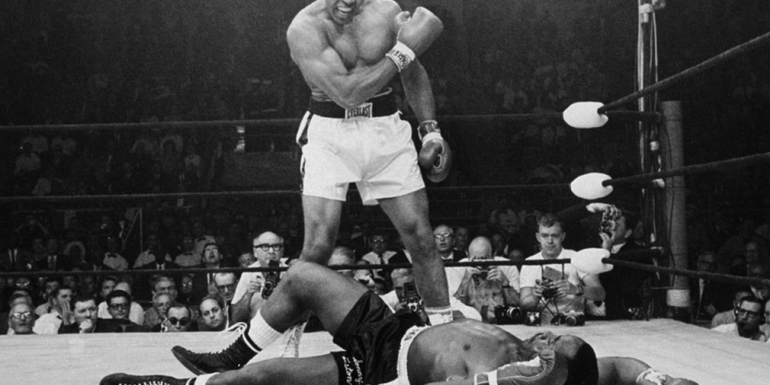By his own words and deeds Muhammad Ali (born Cassius Marcellus Clay, Jr.; January 17, 1942 – June 3, 2016) was the greatest. The outpouring of love and respect at his recent funeral speak volumes of a man who lived a life that positively influenced and impacted others.
This article is dedicated to the man who, ‘floated like a butterfly and stung like bee’, and aims to draw some lessons from his life, that we can all emulate.
Muhammad Ali was undoubtedly a ‘self-leader’. He was very intentional and clearly influenced himself to achieve his own objectives. He had self-awareness and self-confidence by the truck load. Ali demonstrated self-belief (self-efficacy) in the way he embraced new challenges, and even predicted the results. Ali has left a lasting impact on the world of entertainment as well as the world at large with his contribution to civil rights.
7 Self Leadership Lessons
1. Focus On a Worthwhile Goal
Ali started boxing at age 12 after his new bicycle was stolen. Cassius, as he was then, was directed to ask a police officer who was in the basement of the building from which it had been stolen. The basement turned out to be a boxing gym—the officer, Joe Martin, was a boxing enthusiast. After listening to his volley of threats against whoever stole the bike, Martin invited Cassius to come around to his own gym and learn something about boxing.
Six weeks after he started training with Joe Martin, Cassius fought and won his first bout. At 18 he went on to win a gold medal at the 1960 Rome Olympics in light-heavy-weight boxing.
Young Cassius could have let his anger, at the loss of his bike, lead him astray; but under the guidance of a mentor he found a worthwhile goal for his talents.
“I hated every minute of training, but I said, ‘Don’t quit. Suffer now and live the rest of your life as a champion.” Muhammad Ali
2. Choose Your Own Identity
 Within a few minutes of our birth, we are given a name, a nationality, a religion and possibly a sports team – and we can spend the rest of our lives defending these and not knowing why. Cassius had the self-awareness that his birth name did not fit the identity he wished to live. By changing his name in 1964 to Muhammad Ali, ‘the Greatest’ changed his narrative from being a slave to being a proud African American. This choice of identity was executed during a back drop of resistance against white domination in America.
Within a few minutes of our birth, we are given a name, a nationality, a religion and possibly a sports team – and we can spend the rest of our lives defending these and not knowing why. Cassius had the self-awareness that his birth name did not fit the identity he wished to live. By changing his name in 1964 to Muhammad Ali, ‘the Greatest’ changed his narrative from being a slave to being a proud African American. This choice of identity was executed during a back drop of resistance against white domination in America.
Regardless of what race, religion or gender we are born into, we are all human beings and we can choose the identity we wish to live by. Doing so takes courage, because there are always going to be people vested in you remaining the same. Muhammad Ali, inspires us to be a self-leader, and consciously choose our identity.
“Cassius Clay is a name that white people gave to my slave master. Now that I am free, that I don’t belong anymore to anyone, that I’m not a slave anymore, I gave back their white name, and I chose a beautiful African one.” Muhammad Ali
3. Speak Up
We each have a voice, but don’t always use it. Muhammad Ali used his voice to great effect. Whether in promoting his fights, making fun of his opponents, or in speaking his principles, he spoke up.
Muhammad Ali, spoke to ‘Truth to Power’ when he refused conscription to enter the U.S Army and fight in Vietnam. As a conscientious objector he was sentenced to 5-years imprisonment and stripped of his heavyweight title. Ali did not go to jail and his voice was heard by the Supreme Court, 4-years later, who acquitted him.
Speaking up can have a price, but so can remaining silent. If we do not speak our truth, we are not living authentically and can be complicit if wrong is done and we said nothing.
“I know where I’m going and I know the truth, and I don’t have to be what you want me to be. I’m free to be what I want.” Muhammad Ali
4. Be Resilient
Resilience is the ability to endure adversity and bounce back. The self-leader can face defeat and reframe it as a ‘learning experience’.
Ali was facing financial ruin during his boxing ban. He was paying the price for his principles. He was unable to box for four years—losing a window of peak performance as an athlete.
Any entrepreneur knows the feeling of failure. Things don’t always go your way, but you have to stay the course and stay positive. Success is not made in the spotlight; it is forged in the tough times.
“The fight is won or lost far away from witnesses – behind the lines, in the gym, and out there on the road, long before I dance under those lights.” Muhammad Ali
5. Adapt
We live in an uncertain world and the only constant is often change. Muhammad Ali was a master at adapting to change, as he faced different opponents in different locations. Coming out of his ban to face Joe Frazier, Ali was defeated. Preparing to fight Joe again, the landscape changed as Frazier was defeated by the formidable ‘Big’ George Foreman. In what became known as ‘The Rumble in the Jungle’, Ali faced off against the younger and stronger Foreman in Zaire.
Ali’s initial strategy to disorient Forman with ‘right-hand leads’ but failed to hurt his opponent and so he adapted. In what Ali later called the ‘rope-a-dope’, he covered up and leaned on the ropes, causing Foreman expand his energy throwing punches that didn’t earn points. In the 8th round Ali pounced, delivering a 5-punch combination that caused Foreman to stumble on the canvas and Ali to win this historic match.
The ‘David and Goliath’ effect shows that the small guy can win against the giant if he or she can adapt their strategy. Again, Ali inspires us to not look at the obvious and remember there’s always a way to win.
6. Win the Crowd
The Gladiators of First Century Rome, had to win the crowd as well as the fight. Ali was always a firm favorite of the people.
In organizations and in politics, it is not the best ideas or the best candidates who win – but the best supported ones. A key self-leadership strategy is influence, and to influence you have to give people what they value without giving away your authenticity.
Ali gave the people what they wanted – excitement and entertainment, whilst very much being himself.
7. Live Life on Purpose
Ali started his career with the goal to win fights, but a goal is not a purpose, it’s a means of expressing a purpose. Ali’s purpose was freedom, for himself and everyone else.
Ali’s self-aggrandizement might appear, to some, to be narcissistic; but the testimony of his friends and his good works tell a different story. After retiring from boxing in 1981, Ali devoted his life to charitable work.
Muhammad Ali found the perfect vehicle, boxing, to live a life of purpose. He inspires me as a man of intention, who influenced for positive impact – A true Self Leader.



